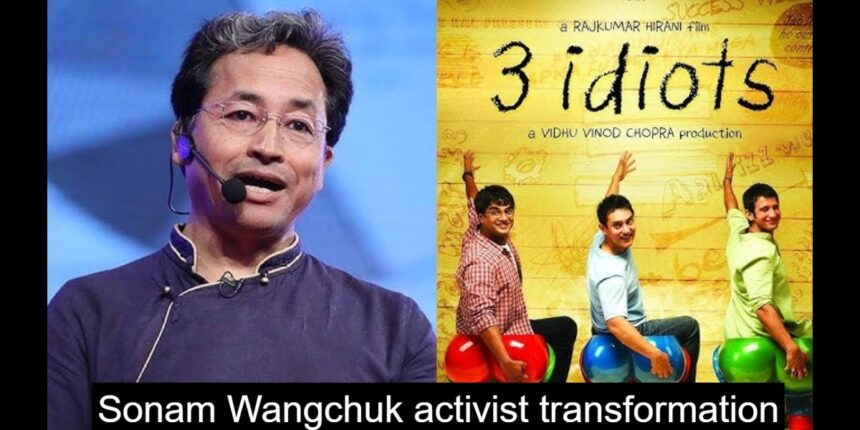Imagine sitting in a dark theater, watching 3 Idiots, when Phunsukh Wangdu bursts onto the screen with his wild inventions and sharp mind. That character? He draws straight from a real man in the snowy hills of Ladakh. Sonam Wangchuk, the engineer behind it all, turned his smarts into tools for change.
This Ladakhi hero started with fixing schools. He built gadgets to fight the cold desert’s tough life. Now, he leads fights against big threats to his home’s land and people. His story shows how one person’s ideas spark real action. We’ll explore Sonam Wangchuk’s activist path, from his early days to bold protests, weaving in the Phunsukh Wangdu real story for fans and changemakers alike.
Early Life and Rise as an Innovator
Humble Beginnings in Ladakh
Sonam Wangchuk, who is fifty-nine, was born in the hamlet of Uleytokpo, which is close to Leh. There were no schools in his village, thus he was reportedly homeschooled until he was nine years old. The family relocated to Srinagar in 1975 when Sonam Wangyal, the father of Mr. Wangchuk, was appointed a minister in the administration of Jammu and Kashmir. Sonam Wangchuk attended a school in Srinagar where the curriculum was taught in Hindi, English, and Urdu, none of which the child could understand.
Mr. Wangchuk has recounted in subsequent interviews that he felt embarrassed by professors who frequently kept him out of the classroom. I was a simpleton from Ladakh who didn’t know Hindi or English while I lived in Srinagar. In an interview with The Week, he said, “I felt insulted, and I had no choice but to end my life.”
Sonam Wangchuk, at twelve, didn’t want to study in Srinagar, so three years later he took a train to Delhi by himself. He was admitted after pleading with the principal of Delhi’s Vishesh Kendriya Vidyalaya. Later, he would go back to Srinagar to attend the Regional Engineering College, which is now known as NIT Srinagar, to study engineering.
Those early struggles shaped his drive. He saw friends drop out because lessons didn’t fit their lives. This pushed him to dream bigger, blending old wisdom with new tech.
Leh’s isolation made everything harder. Yet, it fueled his love for simple fixes that last.
Founding the Students’ Educational and Cultural Movement (SECMOL)
Sonam Wangchuk, together with his brothers and five other people, founded the Students’ Educational and Cultural Movement of Ladakh, or SECMOL, in 1988, right out of college. To generate money, they planned a cultural performance. In the next years, SECMOL provided instructors with training on how to create engaging and activity-based classes for kids. “Teaching and learning have to be a joy,” he stated.
“SECMOL collaborated with the local government on an educational reform initiative in order to make a long-lasting influence. Mr. Wangchuk’s Ramon Magsaysay award citation states that the program, which was piloted in a village school, involved training teachers in a “creative, child-friendly, and activity-based” education; implementing curriculum changes to make subjects relevant to the Ladakhi culture and context; giving English precedence over Urdu to better prepare students for higher education; and promoting the Ladakhi language. For Ladakhi students, SECMOL’s Operation New Hope, which was carried out in partnership with the Ladakh Autonomous Hill Development Council, was revolutionary.
Due to its earthen structure, SECMOL was also the recipient of the 2016 International Terra Award for finest building. Utilising solar technology, the structure depends on the region’s constant exposure to sunshine.
Development of Innovative Solutions
Wangchuk’s brain shines in his inventions for Ladakh’s cold desert. He created ice stupas, tall cones of frozen water that melt slow to irrigate fields in dry months. These structures store winter meltwater, helping farmers grow crops without waste.
He also designed solar heaters from basic parts like black pipes and glass. They warm homes and schools when temps drop to minus 30 degrees. No fancy gear needed—just smarts and local stuff.
His work cuts water use by half in some villages. These fixes tackle climate woes head-on. They prove innovation can save fragile spots like Ladakh.
Inspiration Behind the ‘Phunsukh Wangdu’ Character
Connection to Bollywood’s 3 Idiots
Director Rajkumar Hirani met Wangchuk during a visit to SECMOL. He saw the engineer’s quirky labs and student projects. That sparked Phunsukh Wangdu, the film’s genius dropout who invents wild machines.
The movie hit screens in 2009 and won hearts worldwide. It put Ladakh’s real issues in the spotlight through fun. Wangchuk’s life mirrored the character’s push against stiff rules.
Fans link the two right away. This tie boosts searches for Sonam Wangchuk activist tales.
Public Reaction and Recognition
3 Idiots exploded, selling over 40 million tickets in India alone. Viewers flooded Wangchuk with letters, calling him the true Phunsukh Wangdu. Media outlets like BBC ran stories on his work.
He got awards, such as the Ramon Magsaysay Prize in 2018 for education tweaks. These nods spread his message to cities and abroad. People started donating to SECMOL after the buzz.
The film opened doors. Wangchuk used it to talk at TED events about real change.
Personal Reflections on the Portrayal
Wangchuk once said the movie captured his spirit but added drama for laughs. In interviews, he laughs off the fame, saying it’s all for Ladakh’s kids. He feels the role helped him reach more ears.
He stays humble, focusing on quiet wins over spotlight. This mindset keeps his drive pure. It shows how pop culture can lift real heroes.
His words inspire: Use fun to teach tough truths.
Evolution into Environmental and Social Activism
Advocacy for Ladakh’s Autonomy and Ecology
Wangchuk shifted gears when big projects threatened Ladakh’s wild beauty. He pushed for statehood to guard against unchecked mining and dams. In 2023, protests grew over land grabs that could wreck fragile soil.
Climate change melts glaciers fast, hitting water supplies hard. Wangchuk links this to poor policies from afar. His voice calls for local control to save the ecosystem.
Groups rally around him for Sixth Schedule status. This would shield Ladakh, like tribal areas in the northeast. It’s a fight for home rule amid rising tensions.
Key Protests and Hunger Strikes
Jammu and Kashmir’s unique status under Article 370 was removed by the Centre in 2019, and the state was divided into two Union Territories, of which Ladakh is one. Important Ladakh voices applauded the decision at the time, but in the years that followed, resentment towards the local government grew.
Wangchuk declared a fast at Khardungla Pass in 2023 to draw attention to how climate change is affecting Ladakh’s delicate ecology and to call for protections for the Union Territory under the Sixth Schedule of the Constitution. He was placed under house arrest, and the authorities broke the fast. He held a fast in March of last year, calling for the Union Territory to be protected under the constitution. He pushed for his cause by marching from Ladakh to Delhi in September.
Mr. Wangchuk started a second 35-day fast to support the quest for statehood on September 10. He declared that his “message of peaceful path failed” and ended his fast yesterday when the demonstration descended into violence. “I regret to inform you that on the fifteenth day of our protest, there were many violent, arson, and vandal events in Leh today. Yesterday, two strikers needed to be taken to the hospital. Outrage was triggered by this. Thousands of children took to the streets after a bandh was declared today,” he stated in a video message posted on X.
“Kind of Gen-Z revolution” is how Mr. Wangchuk described today’s young outburst. They haven’t had a job in five years. Unrest in society is inevitable. “This is not a democratic platform,” he declared.
“I appeal to the youngsters to shun the path of violence. This nullifies my five-year struggle. We have been holding strikes, marches, and violence is not our path,” he added.
https://x.com/Wangchuk66/status/1970772174463275500
Strong Words from the Centre for Sonam Wangchuk
The Ministry of Home Affairs issued a forceful statement following the disturbance in Ladakh, stating, “It is evident that Shri Sonam Wangchuk’s aggressive remarks incited the crowd. By the way, he broke his fast and drove off in an ambulance to his village in the middle of these dramatic events without really trying to keep things under control.
According to many NDTV reports today, the Himalayan Institute of Alternative Learning has been under investigation by the CBI for the last two months. According to the reports, which were cited, no case had yet been filed.
In cancelling HIAL’s land allocation, the Ladakh government claimed that the land was not being utilised for the intended purpose.
Mr. Wangchuk had previously stated that the land was given in 2018, but the administration now claims it isn’t being used for its intended purpose. A “design” was also asserted by him in the lease termination.

